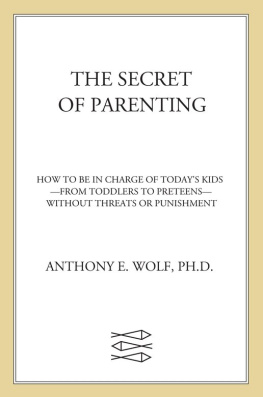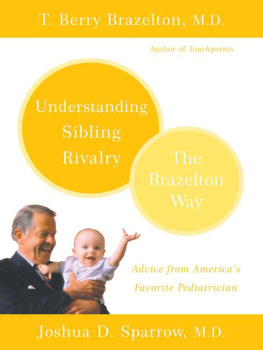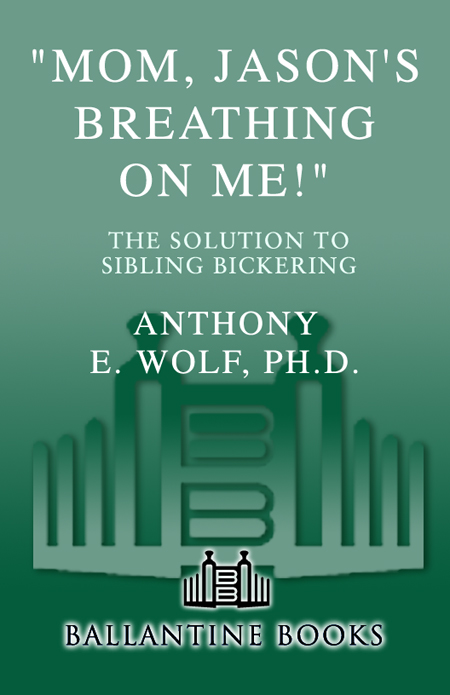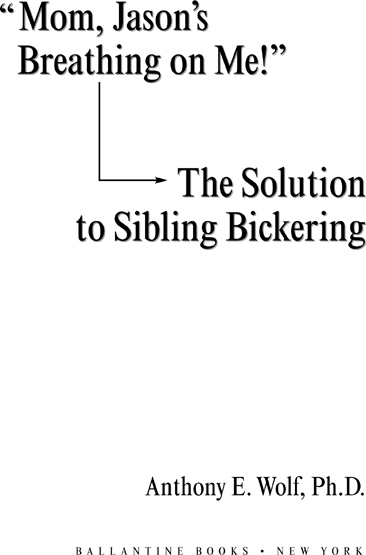I would like to thank Cynthia Merman who edited my manuscript and helped make a book whose words were mine but somehow came out better. I would like to thank my editor at Ballantine, Elisabeth Kallick Dyssegaard. Now into our second decade together, she has been an ongoing pleasure to work with and a wonderful support. Also, as always, my agent, Joe Spieler, for his consistent enthusiasm and his wisdom in steering me in good directions.
I want to thank Diane Nadeau for her amazing readiness to type whatever I gave her and for her very encouraging enjoyment of what she typed. I want to thank Ken Talan for his enthusiastic help in tracking down a reference. Also McDonald's and Starbucks where this book was written and where not once did anyone hassle the older gentleman with his piles of papers.
I want to thank my two ever-available readers, my friend Hugh Conlon and my wife, Mary Alice. I do not know how the book could have been written without their constant support and input. I want to thank my two sisters, Mary and Ellen, for having participated in the same childhood as I did, and having become wonderful friends and supports in my adult life. Last I want to thank my children, Nick and Margaret, for having been a consistent source of joy in my life.
Introduction
Mom, Roger won't stay on his side of the couch. But Angie's hogging the whole thing.
Dad, Debbie took my monkey pillow and won't give it back.
I did not. Benji's a big fat liar.
Sibling bickering can take more joy out of parenting than probably any other aspect of child raising. This is a book about sibling bickeringwhy it happens, what it means, and especially what to do about it. This book offers a very specific solution that worksfor you and your children, for any parents and children. It is a solution that has the power to make the whole process of child raising dramatically more pleasant.
I am a practicing child psychologist and the father of twonow grownchildren. I wrote this book because the method of dealing with sibling bickering that I describe here is one I used myself, recommended to others, and observed the results. It is simple and it works.
The Perfect Parent
Mommy, Nicole says that she's going to flush my drawing down the toilet.
I did not! The little baby. She's taking all my Magic Markers.
But you said I could use them.
I did not, you liar.
Simultaneously: Mommmmm!
Both of you, just calm down. Let's go to the thinking corner. Ashley, you sit here. Nicole, you sit there. Now each of you, one at a time, and what's the big rule?
No interrupting.
Right. Now each of you, one at a time, no interrupting, tell me what happened. Then let's see if we can work out some kind of solution. But remember about solutions neither of you will get exactly what you want. Ashley, you go first.
Though it was hard for the girls not to interrupt each other, Ashley told her side of the story. Then Nicole told hers. Next, the two children and their motherin a relatively short timehashed out a solution. During the process the girls' mother did not so much offer suggestions as encourage the girls to come up with the ideas on their own. In the end the solution they came up with, just as their mother had said, was not 100 percent acceptable to either girl, but it was a solution that they could both live with.
The girls went back to playing, their disagreement now behind them. Their mother was happy. The bickering had ended, and the girls had been able again to work out a resolution to their conflict with a minimum of help from her. The mother smiled.
Then she awoke from her pleasant daydream.
The thinking corner? I hate the thinking corner. Ashley always lies.
I do not. You're the big liar.
Mom, Ashley called me a liar.
Mom, it's not fair. Just because Ashley's a little baby she gets everything. I'm gonna kill you, Ashley.
Mom, Nicole says she's going to kill me.
Where did I go wrong? wondered their mother.
The pleasant daydream just described is more or less what we all feel the perfect parent is supposed to do in response to sibling bickering. And if you are a perfect parent, your children will respond to your perfect-parent behavior by moving toward positive character-building resolutions of conflicts. Conversely, if you are unable to follow the above pattern, you are being less than a perfect parent, maybe far less.
The flaw in all of thisand it is a huge flawis that in reality you are dealing with human children who are not afraid of their parents. With today's children, the just-described perfect parent behavior is not perfect at allbecause it will not work. Not only will it not work, but with the overwhelming majority of siblings the overwhelming majority of the time it is unhelpful, producing only negative results. The old modelthe one we all think of as the idealdoesn' t apply.
Today's kids are different from kids in the past, and parenting is different. Parents today need a whole new approach.
A New World of Parenting
An eight-year-old boy comes to school.
Where did you get that bruise, Jimmy? asks his teacher, noticing a large black-and-blue mark on the side of his face.
My mom hit me.
In every state in the United States today, state law mandates that a teacher has to report the bruise to child abuse authorities.
In the 1930s:
Where did you get that bruise, Jimmy? asks his teacher.
My mom hit me.
Boy, you must have done something pretty bad, responds his teacher.
Back then not all teachers would have responded this way, but they might have. Seventy years ago there were no laws that anybody had to report anything to anyone.











